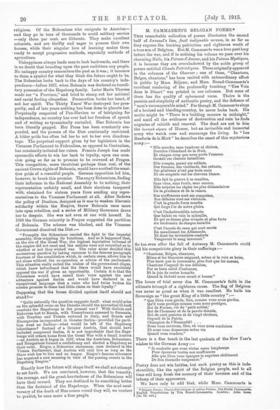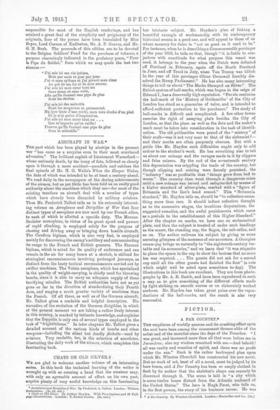M. CAMMAERTS'S BELGIAN POEMS.* THIN remarkable collection of poems illustrates
the second
half of Juvenal's line, feat indignatio versum, in so far as they express the burning patriotism and righteous wrath of a true son of Belgium. But M. Cammaerte was a true poet long before the war, and if in noticing his volume we pass over his charming Noels, his Poemes d'Arnour, and his Pobmes Mystiques, it is because they are overshadowed by the noble group of poems entitled Chants Patriotiquee. These originally appeared in the columns of the Observer ; one of them, " Ohantons, Beiges, chantons," has been recited with extraordinary effect in public by Mme. Rejane; and Mme. Brand-Cammaerts's excellent rendering of the profoundly touching " Una Vol' dans la Desert" was printed in our columns. But none of them has the quality of ephemeral verse. Theirs is the passion and simplicity of authentic poetry, and the defiance of "man's unconquerable mind." For though M. Cammaerts sings of a bruised and bleeding country, he never looks back. His motto might be " There is a budding morrow in midnight," and amid all the evidences of destruction and rain he finds auguries of rebirth and renewal. The dead are not to him the tohEasaa Ketpaya of Homer, but an invincible and immortal army who watch over and encourage the living. In " Lea Renforts de in Mort" he describes the onset of this mysterious army:—
" Elle march°, sans tambour ni olairon, Derriere retendard do la Nuit,
Et cheque coup quo nom ports l'ennemi Grossit sea obscure bataillona.
Elle compte, permi ties soldats, Dos femmes, des vioillarda, des enfants, Sea generaux n'ont pas trois mois Et sea sergents oat les cheveux blancs.
Ella fait la guerre t1 sa maniere, Sans obus, sans fusils, sans canons, Elle m6prise les regles les plus 616mentaires De la prudence at de In raison.
Noe souffrances sent see conquetes, Nos difaites sont see victoires. C'est Is grand° force muette Qui forge l'or do notre gloire.
C'est l'indestructible cohorts Quo balaio en vain la mitraille,
Et qui se dresse plus vivante at plus forte Au lendomain de cheque bataille.
C'est l'arm6e de ceux qui sent morts
En maudissant les Allemande, Et dont les invincible, ronforts Vengeront to sang innocent."
So too oven after the fall of Antwerp M. Camtuaerts could bid his compatriots glory in their sufferings :— " Chantons, Beiges, chantons, Mime si les Measures saignent, menus si la voix se brim,
Plus haut que la tourmente, plus fort que les canons, Chantons rorgueil do nos (Waite°, Par ce beau soleil d'automne, Et la joie de rester honnete
Quand la 1ichet6 nous sorait si bonne."
The hours of trial never dim M. Cammaerts's faith in the ultimate triumph of a righteous cause. The flag of Belgium was never so great as when it was smallest. He hails his Sovereign as "the great King of a little country " :—
" Que Dieu you. garde, Sire, comma vette nous garde;,
Qu'il vous protege comma vous nous proteges, Roi de Fumes, roi du petit midst,' Roi de l'honneur et do la parole donee,
Roi de cent prairies at de vingt clochers,
Orgueil do la Patrie, Champion de l'Humanite! . . .
Nous vous suivrons, Sire, oa vous nous conduires
Et nous vous donnerons notre vie Quand vous voudrez."
There is a fine touch in the last quatrain of the New Year's
wishes to the German Army :—
"Jo souhaite que vous viviez asses longtemps Pour eprouver touter nos souffrauces
Ann que Dieu vous epergne lo supreme chdtimont De Son 6ternelle vengeance."
Poetry does not win battles, but such poetry as this is inde- structible, like the spirit of the Belgian people, and to all
time will keep fresh the memory of their heroism and of the
infamy of their oppressors.
We have only to add that, while Mme. Camma.erts is
• Belgian Poems: Chants Patriotigues et autres Pante& Par Emile Cammaerte. English Translations by Tita Brand-Cammaerts. London John Lane. [4s. Gd. not.)
responsible for most of the English renderings, and has retained a great deal of the simplicity and poignancy of the originals, four of the poems have been translated by Miss Beyer, Lord Curzon of Kedleston, Mr. A. P. Graves, and Mr. G. H. Bush. The proceeds of this edition are to be devoted to the Belgian Soldiers' Fund for the purchase of tobacco, a purpose charmingly indicated in the prefatory poem, " Pour la Pipe du Soldat," from which we may quote the last two stanzas :—
"J'ai mis ici ma vie intime,
Mois par mois at jour par jour.
J'ai ri Mtn rythme et j'ai pleur6 sans rime Au gro de ma foi et de mon amour. J'ai mis ici mon occur tout nu
Sans eoran at sans voile,
Alin qu'Ils fument une pipe de plus
Sous les etoiles.
J'ai mis ici des nalvet6s Dont lea moquours se gausseront.
Ma lyre tinte d'une corde, mon vers cloche d'un pied
Et jo n'ei gni:re d'inspiration. J'ai mis ini mon occur tout nu . . .
Quo m'importe qu'on raille I
Pourvu foment une pipe de plus Sous In mitraille."











































 Previous page
Previous page